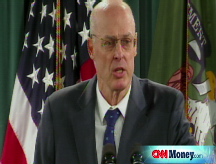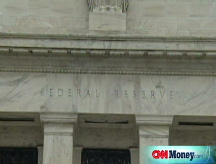'Grave threats'
Fed chairman tells Congress $700B bailout package is best way to stop Wall Street ripples from hitting Main Street.
NEW YORK (CNNMoney.com) -- Federal Reserve Chairman Ben Bernanke was back on Capitol Hill Wednesday, warning that the current financial crisis is the most significant in more than 60 years, and that even tougher times are ahead without quick Congressional approval of a controversial Wall Street bailout.
Bernanke, testifying before the Joint Economic Committee, found a lot of senators and representatives voicing support for taking action to address the crisis - even if they had problems with some aspects of the Bush administration's proposal to have the Treasury Department buy as much as $700 billion in mortgage-backed securities.
But members of the panel repeatedly asked Bernanke for arguments they could use to explain to angry voters back home why they voted for such a plan.
Bernanke, a former college economics professor, obliged by giving them a rundown of the problems that would ripple out from Wall Street to Main Street due to the current credit crunch.
They included small businesses not being able to get financing and therefore not being able grow and hire workers, consumers not able to get car loans and automakers having to cut back production and idle more auto workers and plants, college students not able to get loans they needed to attend school, and home prices continuing to fall because potential buyers won't be able to get mortgages.
"Credit will be restricted further. That's not just an inconvenience; that will affect spending and economic activity," he said in response to one question. "It will affect the unemployment rate. It will affect real incomes. It will affect everybody's standard of living."
"It's about the overall performance of the U.S. economy over perhaps a period of years," Bernanke added. "The choking up of credit is like taking away the life blood away from the economy."
Banks and Wall Street firms essentially stopped lending to each other last week in the wake of the government takeover of mortgage giants Fannie Mae (FNM, Fortune 500) and Freddie Mac (FRE, Fortune 500), after the failure of Lehman Brothers, the Fed's $85 billion bailout of insurer American International Group (AIG, Fortune 500) and the sale of Merrill Lynch (MER, Fortune 500) to Bank of America (BAC, Fortune 500).
Bernanke said there is plenty of blame to go around for the current crisis, as he named Wall Street firms and banks that underestimated risk of the securities they were creating, rating agencies and regulators.
But he said the primary problem is a drop in home prices, which sparked a rise in foreclosures that have cut the value of trillions of dollars of mortgage-backed securities to what he termed "fire sale" prices.
The lack of demand for those securities, in turn, forced banks and Wall Street firms to take $500 billion in charges that dug into the capital they use to make loans.
Bernanke said that when the government starts buying the mortgage-backed securities from the banks, it will provide a market that doesn't exist now, and allow the prices to rise from the current depressed levels to ones more justified by the fundamentals of the loans, most of which are not in default.
"I realize it's a very complicated story," Bernanke said. "The bottom line, though, is banks are holding all these complex hard-to-price securities and their capital is low. Those two things together don't allow them to make adequate loans. This approach is one way to address the problem."
And he stressed repeatedly that while the Treasury Department plans to spend up to $700 billion buying the securities, it can expect to recoup most if not all of that money by selling them at a higher price later on, once markets have stabilized. He argued that doing nothing would cause the economy to slow so much that there would be a bigger hit to tax collections than the program will eventually cost taxpayers.
Bernanke said he expects most of the securities will be bought through a reverse auction, in which holders would offer them for sale and the government would buy those offered at the best price.
The Fed chief's comments come a day after he appeared with Treasury Secretary Henry Paulson before the Senate Banking Committee to urge action on the bailout package. The two were also set to testify on the proposal before the House Financial Services Committee later Wednesday.
Supporters of the measure are pushing for Congress to act on the bailout before its recess. The recess had originally been scheduled to start at the end of this week, but the current session could be extended to debate and vote on the plan.
Sen. Charles Schumer, D-N.Y., the chairman of the economic committee, said he would work in a bipartisan manner to pass the bailout but he vowed changes.
"Let us be clear, Americans are furious. And they are right to be astonished and very angry," Schumer said.
Sen. Sam Brownback, R-Kan., said lawmakers were receiving reports of real-world problems facing businesses and individuals.
But Brownback questioned some of the terms of the Bush administration's plan. He joined Schumer in pushing for a provision of the rescue plan that would give taxpayers equity in firms that sell assets to the government.
"I believe it would be irresponsible to not act, but we must act responsibly," Brownback said.
But many senators and representatives also said that their voters back home are too angry to accept the bailout.
"I think President Bush did properly diagnose it when he said the problem was that Wall Street got drunk and has a hangover. The problem is the people who are asked to clean up all the broken furniture, they didn't get invited to the party," said Rep. Lloyd Doggett, D-Texas. "That's why so many of the people that are contacting me are not just against this bailout, they're very angry they're even being asked."
Several members of the committee, both Democrats and Republicans, suggested imposing a tax on Wall Street firms and banks to help pay the cost of the bailout program. Bernanke didn't object to the idea, although he suggested that the tax not take effect in the near term because of the current problems facing the sector.
"We don't want to impair [them] in the near term," Bernanke said. "Doing something with a longer horizon might be worth considering." But he said that is up to Congress and the Treasury to negotiate, and not for the Fed to take a position on.
Bernanke was more reluctant to support the idea proposed by several senators and representatives that banks who sell the securities to the government have to offer equity in the firms as well. And he also was reluctant to back the proposal to limit the pay of Wall Street executives whose firms sell the securities, though his objections were somewhat less strenuous than his opposition to demanding equity.
Bernanke said such provisions would stop many firms from selling their assets to the Treasury Department, which could leave it with only the worst performing assets from the most troubled companies.
"You have the risk that no one will participate, there will be no competition in the auction and it won't work," he said.
Some members of the committee indicated they will vote against the measure, no matter what provisions are included. Rep. Ron Paul, a Texas Republican who formerly belonged to the Libertarian Party, charged that the bailout plan amounted to price fixing, which he said was a major cause of the depression.
He argued trying to lift the value of mortgage-backed securities and keeping home prices from falling further only will cause deeper economic problems long term.
"Most illiquid assets are illiquid because they're not worth anything," he said. "All the blame is put on the fact that there is a downturn in housing. That means they were overpriced. All our efforts right now is to keep those (house) prices up, but the prices should come down. That's what the market is saying."
Bernanke agreed with Paul that price fixing was one of the causes of the depression, but he denied that the purchase of assets amounted to the government setting prices. He argued the auction process to be used to buy the securities would try to find a fair market price of the assets, even if it is above current "fire sale" prices.
And he said one of the causes of the Great Depression was the Fed being afraid of intervening to prevent bank failures.
"One has to balance concerns about intervening in financial markets with concerns about macroeconomic stability," he said.
Rep. Baron Hill, D-Ind., asked Bernanke whether there is a risk of a depression if the bailout doesn't pass.
While the Fed chairman quoted investor Warren Buffett as saying the economy would go "over a precipice" without the plan passing, he said he wouldn't compare it to the Great Depression. But he said without the bailout, there would be a lot of unnecessary problems and costs for the economy and the American consumers and businesses.
"My response is the pain would be very significant, It would be very difficult for Main Street if this credit system broke down, and very costly to average people," he said. "Here's a better solution, to recognize that things went wrong but there's a problem now that we can solve." ![]()



